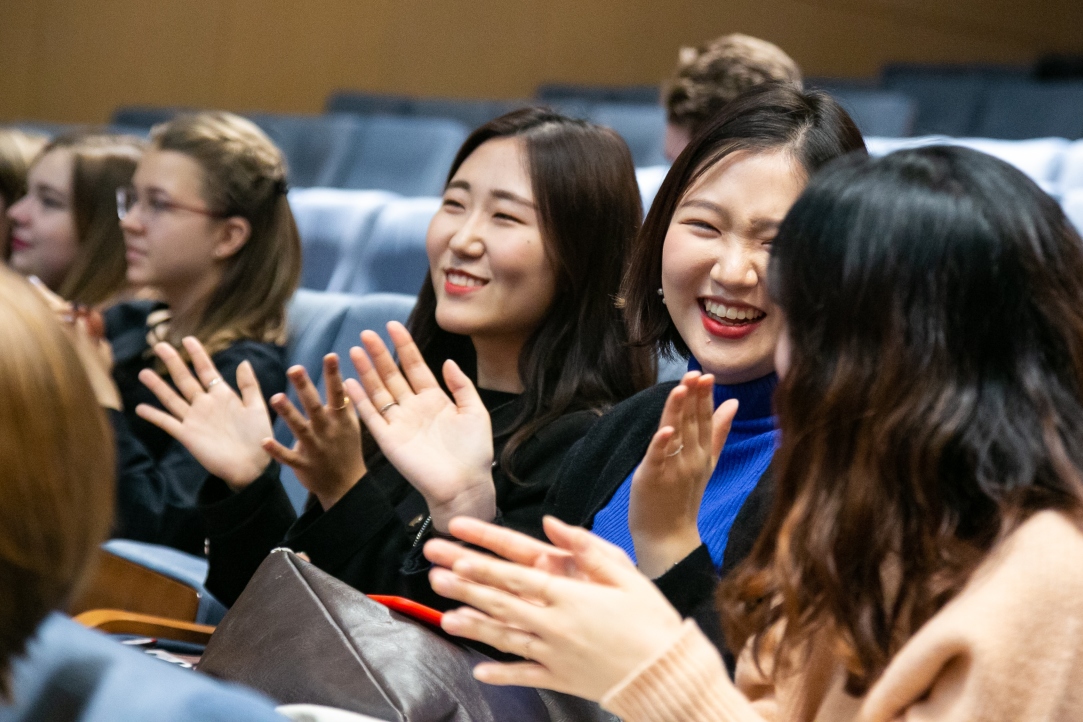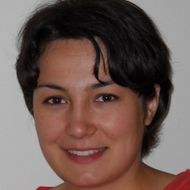‘I Feel at Ease in Russian Class’

Since September of this academic year, the HSE International Prep Year (IPY) programme has offered a supplemental Russian language course for international students studying at HSE. It is designed for students who have successfully graduated from the preparatory programme and are now studying in undergraduate or graduate programmes at HSE on Russian government scholarships. The HSE News Service spoke with students about the course and learned how it is helping them in their studies at HSE.
Many foreign students come to HSE’s IPY programme with no prior knowledge of Russian. Upon entering the University, they therefore do not yet possess sufficient mastery of the language to study in a Russian-taught programme at the same level as a native speaker. To solve this problem and help foreign students adapt to the academic Russian-speaking environment, the programme decided to organize additional training in Russian for first-year international undergraduate and graduate students.
‘The new supplemental Russian language course provides additional training for international students,’ says Alexandra Nazarchuk, Director of the International Preparatory Year. ‘When developing the course, the organizers were primarily guided by students’ needs and weaknesses. The main goal of the programme is to make sure that students speak Russian at a sufficient level that allows them to study in their chosen area alongside their Russian peers.’
The course focuses on deepening students’ knowledge of the Russian language and familiarizing them with Russian academic style and register
Students develop their skills in academic speaking and scholarly writing in addition to practicing their ability to understand and outline scholarly material specific to their area of specialization.
After completing the course, students will be prepared to pass the certification exam in Russian at the TRKI-2 (B2) level. The course meets four times a week at a time convenient for the students. Group instruction takes place both face-to-face and online.
Wan Jiachen, originally from the small Chinese city of Jianyin, is currently a first-year Master’s student studying Muslim Worlds in Russia (History and Culture). He began studying Russian as an undergraduate student at the Capital Normal University in Beijing, and now he is additionally studying Russian at HSE on Wednesdays remotely.
‘In class, we study grammar, vocabulary, and prepare for the B2 exam,’ says Wan Jiachen. ‘For me the hardest thing is distinguishing between Russian words that are similar to each other. But learning new words is very interesting. Our teacher Elena Alekseevna pays great attention to colloquial speech. We learn not only words from books, but also popular expressions. In class, we also read social and political texts and listen to audio recordings of news reports. All of it is extremely useful.’
Xu Hantong, a first-year Bachelor’s student of Philology, is from Harbin. She began learning Russian in school, and it was then that her teacher recommended that she study in Russia. She also studies online for several hours a week in a free Russian language course at HSE.
‘The course helps us get used to reading Russian literature. Studying philology always means mastering a large number of books, so it’s not easy for me,’ says Xu Hantong. ‘The Russian language is challenging; there are many unfamiliar words, and I often get confused about what word to use in what situation. But our teachers help us overcome these difficulties, using interesting techniques. For example, they show short videos, play songs, and show infographics. So I feel at ease in Russian class.’

Elena Aisakova, Visiting Lecturer, HSE International Preparatory Year
It has long been noted in the methodological literature that upon reaching an advanced level of proficiency in a foreign language, when a person understands almost everything and can express himself quite freely, his motivation for further study drops sharply, and there is often a great temptation to quit classes. Students taking the IPY supplemental course do not lose their desire to improve their knowledge.
Since September, we have formed friendly multinational groups that bring together both undergraduate and graduate students. Their starting level was about the same, but their linguistic interests were somewhat different: some were more interested in vocabulary, others wanted to focus on syntax. As a result, there was a mutual enrichment. Students got each other interested in aspects of the language that they otherwise might not have wanted to learn much about.
The main quality of our students is diligence. Every week they come to class with new questions about the language, and the amount of complex language problems that we must overcome together does not scare them at all. I am amazed by their desire to understand subtleties such as, for example, numerous verb prefixes or the stylistic characteristics of words. They are making progress in mastering the Russian language, and I hope that they will continue to study it in the future.
Elena Aisakova
See also:
‘My Prep Year Experience Has Been Phenomenal; I Would Repeat It All over Again if I Could’
The International Preparatory Year programme held its graduation ceremony in July. This academic year, 125 students from 50 countries were enrolled in the programme. They will continue their studies at Russian universities, most of them pursuing bachelor's and master's programmes at HSE University. The graduation was organised as a quest, where the students were able to demonstrate their achievements in learning the Russian language. Graduates from Ecuador, Syria, and Mexico shared their impressions with the HSE News Service, Deputy Director Polina Shanko talked about plans for the coming year, and mathematics teacher Vladimir Gordin gave his advice to future students.
HSE University and Rossotrudnichestvo Agree to Train Specialists in Teaching Russian as a Foreign Language
HSE University and Rossotrudnichestvo have signed an agreement to establish a Russian Language Centre at HSE University in St Petersburg. It will train teachers of Russian studies and future leaders of educational programmes and courses of Russian as a foreign language. The document was signed by HSE University Rector Nikita Anisimov and Head of Rossotrudnichestvo Yevgeny Primakov at the St Petersburg International Economic Forum.
‘Russia Is a Land of Openness and Possibility’
Lorenzo Trufolo graduated from Bologna University and is studying in the HSE International Preparatory Year ahead of his master’s studies in international trade at HSE University. In his interview, he talks about his studies in Russia, participation in academic conferences and competitions, and the challenges of living in Moscow.
HSE Prep Year Students Present Their Research Papers at International Conference in Tomsk
From April 25 to 27, a scientific student conference was held at Tomsk Polytechnic University (TPU). It was attended by international graduate students and postgraduate students from 57 countries, including four students from the HSE Preparatory Year programme. The HSE News Service talked to the conference organisers and participants about their impressions of the event.
‘The 4th International Economics Olympiad—My Journey’
Oghogho Joy Isibor came to HSE University after earning a scholarship from the Faculty of Economic Sciences for her performance in the International Economics Olympiad. She is one of several foreigners to apply via the same competition. Oghogho is currently studying on the HSE University Preparatory Year Programme before starting her Economics degree. Read on to find out about her experience of the Olympiad, adapting to life in Russia, and the challenges of learning Russian for her future studies.
‘I Made a Lot of Friends and My Speaking Level Improved’
On December 23, students of the HSE Preparatory Year got together for a festive Russian speaking club. They expanded their vocabulary and cultural outlook by immersing themselves in Russian winter holiday traditions and even played the role of Ded Moroz—the Russian Santa.
‘The City of Moscow Inspires Me with the Joy of Living’
The new academic year is gaining momentum at the HSE Preparatory Year, with students from over 40 countries currently enrolled. The HSE News Service talked to the new students about their first impressions and the challenges of studying at HSE University and living in Moscow, while teachers of the Prep Year extracurricular clubs shared their ideas and plans for future activities.
‘A High Concentration of Intercultural Communications’
The team of the HSE International Preparatory Year said goodbye to its students at a graduation party that took place at the HSE Cultural Centre. 197 students from 58 countries graduated from the programme this year. They learned Russian and profile subjects in Russian, which has helped over 100 of them to enrol in degree programmes at HSE University.
Applications Open for HSE University Intensive Summer Language School 2022
This summer, the HSE University Russian Language Centre will offer intermediate and advanced Russian-language students an opportunity to learn and practice their skills while immersing themselves in Moscow life.
American Students Delve into Russian Language, Culture, and History
On February 1, a group of American students started their short-term on-campus study programme at HSE University. During three months, the students will take courses in post-Soviet Russian history, contemporary Russian domestic and foreign policy, social anthropology, and a practical course of Russian as a Foreign Language.


